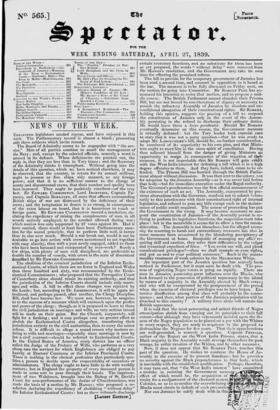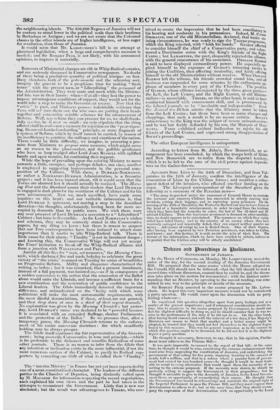NEWS OF THE WEEK.
EXHAUSTED legislators needed repose, and have enjoyed it this week. The Parliamentary record is almost a blank ; presenting only three subjects which invite remark. The Board of Admiralty seems to be unpopular with "the ser- vice." Men of all parties combine to assail the management of the Navy ; and, except by the salaried officials, scarcely a word is uttered in its defence. When deficiencies are pointed out, the reply is, that they are less than in Tory times ; and the Secretary of the Admiralty thinks it triumphant. Without going into the details of this question, which we have noticed elsewhere, it may be observed, that the country, in return for its annual millions, ought to possess as fine ships, ably manned, as any foreign power; and that it is no sufficient answer to the charge of scanty and discontented crews, that their number and quality have been improved. They ought be positively excellent—of the very best. Sir EDWARD CODRINGTON, Lord INGESTRIE, Captain PE- CELL, and Captain BERKELEY, all state that officers commanding British ships of war are distressed by the deficiency of their crews; and the temptation to desert is so strong, in consequence of the extra labour on board, that it is hazardous to touch at foreign ports. Sir EDWARD CODRINGTON moved a resolution, de- claring the expediency of raising the complements of men in all vessels actively employed, to the number allowed during war ; which motion was only supported by 27 votes against DO. Had it been carried, there would at least have been Parliamentary sanc- tion for the sound principle, that to perform little well, is better than to slur over much. Should a war break out, would it not be desirable to go into action with crews accustomed to act together with easy alacrity, than with a part newly engaged, added to those who have been harassed and exasperated by over-work? Surely a few ships, with plenty of men well disciplined, are preferable to double the number of vessels, with crews in the state of discontent described by Sir EDWARD CODRINGTON.
The abolition of the criminal jurisdiction of the Inferior Eccle- siastical Courts, of which there are no fewer in England and Wales than three hundred and sixty, was recommended by the Eccle- siastical Commissioners ; who proposed that the Prerogative Court of Canterbury alone should retain its existing authority, and that the jurisdiction of the Inferior Courts should include only marri- ages and wills. A bill to effect these changes was rejected by the Lords ; but, according to Dr. LUSHINGTON, it will be again in- troduced, and perhaps passed, after another, the Clergy Discipline Bill, shall have become law. We must not, however, be sanguine BS to the success of a measure which will encroach upon the profits and power of the clergy ; though, as it is proposed to leave to them the civil jurisdiction on marriages and wills, no very serious inroad will be made on their gains. But the Church, corporately, will fight for a farthing ; and it may perhaps cost no greater effort to abolish the Ecclesiastical Courts altogether, transferring their jurisdiction entirely to the civil authorities, than to carry the minor reform. It is difficult to allege a sound reason why matters re- lating to wills and marriages—especially since marriage is now by law a civil contract—should be referred to Ecclesiastical Courts. In the United States of America, every district has an officer called the Judge of the Probate of Wills, who performs at a very cheap rate the services for which Englishmen are obliged to pay heavily at Doctors' Commons or the Inferior Provincial Courts. There is nothing in the clerical profession that particularly qua- lities a person to decide upon the respectability of executors or administrators. The clergy ought to have little to do with worldly matters ; but in England the property of every deceased person is made in some sort to pass through their hands. The imprison- ment of two Welshmen, brought into the Bishop of St. David's Court for non-performance of the duties of Churchwardens, was made the basis of a motion by Mr. HAwEs ; who proposed a re- solution declaring the expediency of abolishing " without delay" the Inferior Ecclesiastical Courts : but as these tribunals discharge
(LATEST EDMON1 certain necessary functions, and no substitute for them has been as yet prepared, the words " without delay " were removed from Mr. HAWES'S resolution, and the Government may take its own time for effecting the promised reform. The bill to provide for the temporary government of Jamaica has been read a second time, and counsel in opposition to it heard at the bar. The measure is to be fully discussed on Friday next, on the motion for going into Committee. Sir ROBERT PEEL has an- nounced his intention to resist that motion, and to propose a mid- dle course. The British Parliament cannot abandon their Prisons Bill, but are not bound by considerations of dignity or necessity to punish the refractory Assembly of Jamaica by absolute and un- conditional abrogation of their constitutional rights. Sir ROBERT, holding this opinion, suggests the passing of a bill to suspend the constitution of Jamaica only in the event of the Assem- bly persisting in the refusal to discharge their ordinary duties. He would leave them a locus pcenitentke. Should Sir ROBERT eventually determine on this course, the Government measure is virtually defeated : but the Tory leader took especial care to state that it was not a party question—that he was ready to adopt Mr. LABOUCHERE'S bill, should he, on further consideration, be convinced of its superiority to his own plan, and that Minis- ters ought to meet him in the same spirit of conciliation. Having thus relieved himself from the danger of giving Ministers an opportunity to resign in consequence of the rejection of their measure, it is not improbable that Sir ROBERT will gain eibdit with the West India interest for defeating a bill which is in a high degree offensive to them. And they have, indeed, cause to be of- fended. The Prisons Bill was hurried through the British Parlia- ment almost without discussion. It was then sent to the colony, not for adoption by the Jamaica Assembly—as it was never laid before that body—but for immediate execution under the Royal authority. The Governor's proclamation was the first official announcement of the existence of such an act. The Assembly, exasperated by pre- vious altercations with the Governor, resolved not to submit volun- tarily to this interference with their constitutional right of internal legislation, and refused to pass any bills except such as the mainte- nance of public credit required. The course of proceeding has put the Government in the wrong. It may become necessary to sus- pend the constitution of Jamaica—if the Assembly persist in re- fusing to perform its legislative functions, the suspension must take place : but in the meanwhile it seems fair to allow a time for recon- sideration. The Assembly is not blameless ; but the alleged neces- sity for resorting to harsh and extraordinary measures has also in some measure been occasioned by the blundering precipitancy of the Government at home. Incapable of managing any affair re- quiring skill and caution, they solve their difficulties by the vulgar and tyrannical expedient of force. "You resist our will, and plead. constitutional privileges ?—then we shall trample on your rights, and put an end to your political existence." Such is the states- manlike treatment of weak colonies by the MELBOURNE Whigs. An important part of the Jamaica question has scarcely been noticed in Parliament, but it must soon be dealt with. The pro- cess of registering Negro voters is going on rapidly. There are men in Jamaica, possessing great influence over the Blacks, who look forward to the possession of political supremacy in the island by means of a majority in the Assembly elected by Black votes ; and who will be exasperated by the postponement of the period. when the exercise of electoral privileges was to have begun. Ex, tensive disaffection among that class will probably be the conse- quence; and then, what portion of the Jamaica population will be attached to this country ? A military force alone will sustain the British supremacy.
It is said that the most persevering and ardent friends of Negro emancipation shrink from carrying out its principles to their full extent—that although they have vehemently insisted upon the fit- ness of the Negro population to be placed on a par with the Whites in every respect, they are ready to acquiesce in the proposal to disfranchise the Negroes for five years. That their apprehensions are well-grounded, is scarcely a question. Captain PRINGLE, author of the Report on the West India Prisons, states, that a Black majority in the Assembly would revenge themselves for past wrongs, by unfair taxation of the Whites, and by other measures. Now, it does not appear that Sir ROBERT Pere touches this part of the question. He wishes to continue the House of As- sembly in the exercise of its present functions ; but lie provides no security against the Black preponderance in that body, which is inevitable with the established qualification. Perhaps, therefore, it may turn out, that "the West India interest" have committed a mistake in resisting the Government measur effect of which would be, the acquisition of tunity for a readjustment of the electoral system Colonies, so as to neutralize the overwhelming i Blacks must obtain in default of such precautim Nor can Jamaica be safely dealt with in this= - —: The neighbouring islands. The 350,000 Negroes of Jamaica will not be content to stand lower in the political scale than their brethren Barbadoes or Antigua; and we are not aware that the Coloured classes in the other islands are of higher intelligence, or less eager for retaliation, than those of Jamaica.
It would seem that Mr. LABOUCHERE'S bill is an attempt at piecemeal legislation, when a large and comprehensive measure is needed ; and Sir ROBERT PEEL is not likely, with his announced opinions, to improve it materially.



























